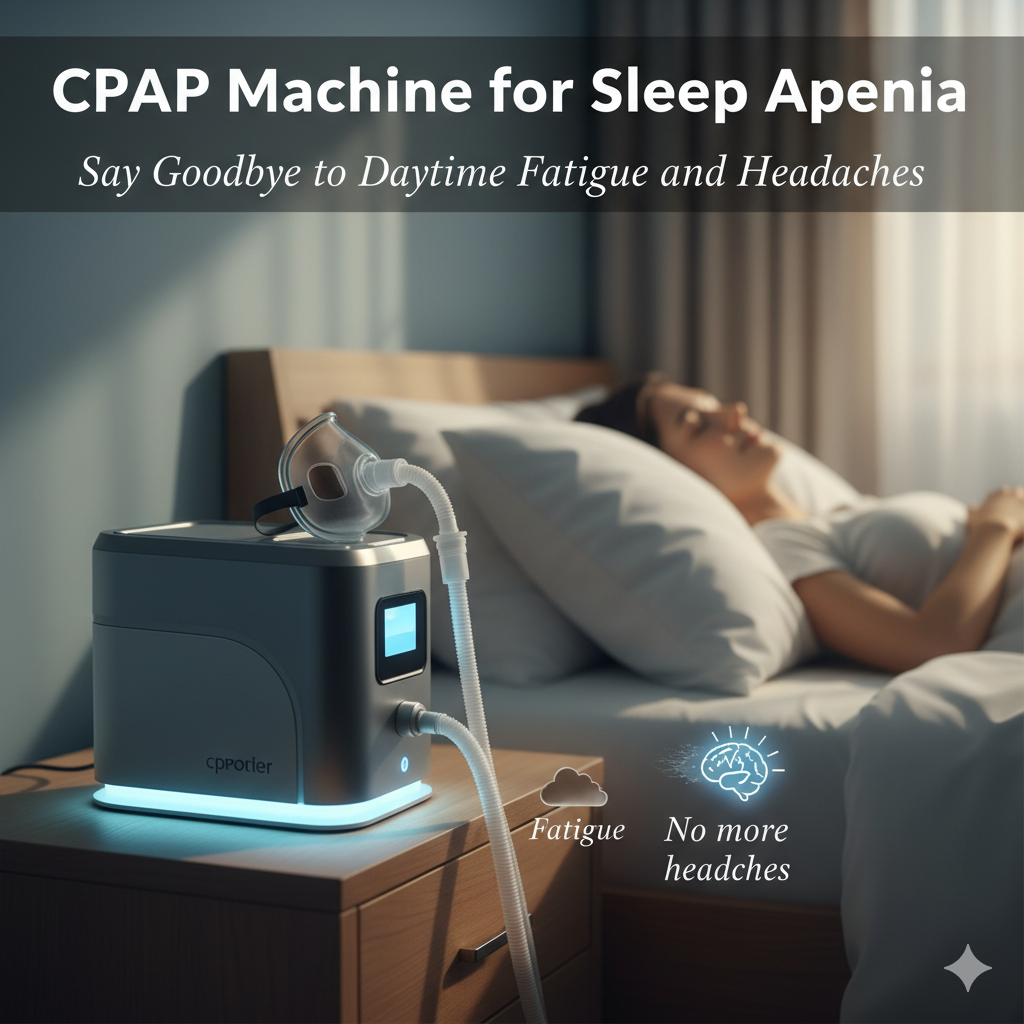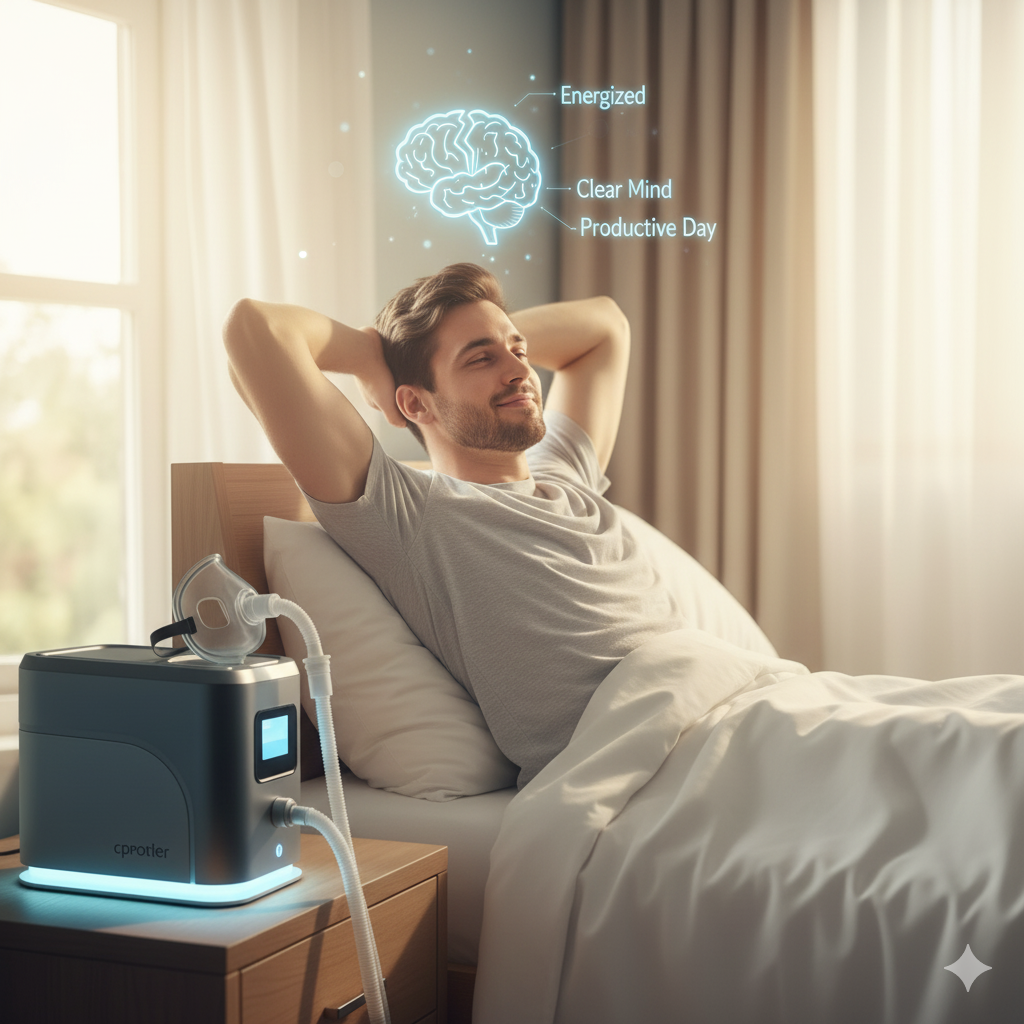CPAP Machine for Sleep Apnea: Say Goodbye to Daytime Fatigue and Headaches


Meta Description: Discover how a CPAP machine for sleep apnea restores energy, reduces headaches, and protects your long-term health. Learn how it works, its life-changing benefits, and why it’s the gold standard for better sleep.
Alt Text for Image: Person sleeping peacefully using a CPAP machine for sleep apnea therapy.
Introduction
If you’re waking up groggy, battling headaches, and dragging through your day despite “sleeping” eight hours, you may not be sleeping at all. Sleep apnea silently robs millions of people of restorative rest, leaving them exhausted and at risk for serious health problems. Fortunately, there’s a proven solution: the CPAP machine for sleep apnea.
This life-saving device not only improves your sleep—it transforms your health, energy, and quality of life. Here’s how it works and why it might be your key to waking up refreshed.
How CPAP Works: A Lifesaver at Night
CPAP (Continuous Positive Airway Pressure) machines gently push air into your airway through a mask, preventing the collapse that causes breathing pauses during sleep.
- Keeps Airway Open: No more nighttime oxygen drops.
- Customizable Masks: Choose from nasal pillows, nasal masks, or full-face masks to suit your comfort.
- Quiet Technology: Modern CPAP machines are designed to be nearly silent.
Think of it as a personal sleep bodyguard—keeping your airway open all night long.
4 Powerful Benefits You’ll Feel Fast
The benefits of CPAP therapy often show up within days or weeks of consistent use.
1. Restorative Sleep
Finally cycle through all the sleep stages your brain and body need. Users often report waking up feeling “human” again after years of fatigue.
2. Lower Blood Pressure & Heart Protection
Sleep apnea strains your heart. CPAP reduces this burden, helping lower blood pressure and protect your cardiovascular health.
3. Sharper Mind & Better Mood
Brain fog, irritability, and forgetfulness fade when oxygen and sleep cycles stabilize. Patients often report clearer thinking and a noticeable mood boost.
4. Fewer Morning Headaches & Snoring
Headaches caused by low nighttime oxygen vanish—and partners rejoice at the silence when snoring stops.
Safety First: Safer Driving & Lower Accident Risk
Sleep apnea increases your risk of car accidents by up to 70% due to drowsy driving. CPAP use slashes this risk, making roads safer for you and everyone else. Restful sleep isn’t just personal—it’s public safety.

Why Some People Struggle—and How to Overcome It
Yes, CPAP takes adjustment. Some users feel claustrophobic, experience dry nose, or struggle with the mask. But these challenges can be overcome:
- Try different mask types until you find the perfect fit.
- Add humidification to prevent dryness.
- Ease in by using the CPAP during naps or reading time.
- Behavioral therapy can help with long-term adherence.
Remember: the short-term discomfort is worth the long-term health gains.
Long-Term Gains: Health & Longevity
CPAP is more than nightly relief—it’s an investment in your future. Studies show that consistent use reduces risk of heart attacks, strokes, and even early death. Over time, you’ll notice not only improved energy, but also better emotional well-being and mental clarity.
Tips to Get Started & Stay Consistent
- Commit for at least 30 days—your body needs time to adapt.
- Track your progress using CPAP machine data and sleep apps.
- Celebrate small wins—more energy, fewer naps, better mood.
- Stay connected with your provider to adjust settings or try new masks if needed.
Conclusion
Daytime fatigue and headaches don’t have to control your life. A CPAP machine for sleep apnea is a proven solution that restores your energy, protects your heart, and helps you wake up feeling refreshed.
Don’t wait—consult your sleep specialist and give yourself the gift of restorative sleep. Because better nights mean better days.
FAQs
Q: How soon will CPAP help me feel better?
Many people notice improvements within days, though full benefits can take several weeks.
Q: What if I can’t tolerate the mask?
Work with your provider to try different mask styles, add humidification, or adjust pressure settings.
Q: Can CPAP reduce my snoring?
Yes. CPAP virtually eliminates snoring by stabilizing airflow all night.
















